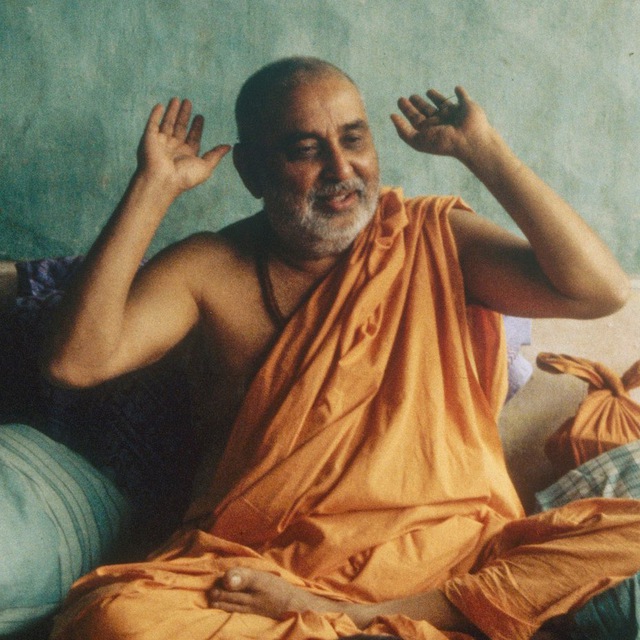
Prasang A Day
BAPS Prasangs
Recent Posts
Attain the abode of God
Vishnu-yãgs; annually celebrate Janmãshtami, Ekãdashi and other observances; and gather brahmachãris, sãdhus and satsangis on these occasions. After all, even if a sinner remembers these occasions at the time of his death, he will also attain the abode of God.”
[Gadhadã I-3.2]
Vishnu-yãgs; annually celebrate Janmãshtami, Ekãdashi and other observances; and gather brahmachãris, sãdhus and satsangis on these occasions. After all, even if a sinner remembers these occasions at the time of his death, he will also attain the abode of God.”
[Gadhadã I-3.2]
Means to Please the Holy Sadhu
Ãnandãnand Swãmi asked further, 'How can a person please such a great Purush?'
Shriji Mahãrãj explained, 'First of all, he must be honest with that great Sant. He must also forsake lust, anger, avarice, infatuation, matsar, egotism, jealousy, arrogance, and all desires and cravings. Moreover, he should behave as a servant of the Sant and maintain a constant effort to eradicate egotism from his heart. While doing so internally, he should physically continue to bow to everyone as well. As a result, the great Sant will become pleased with him.'
[Gadhadã I-58]
Ãnandãnand Swãmi asked further, 'How can a person please such a great Purush?'
Shriji Mahãrãj explained, 'First of all, he must be honest with that great Sant. He must also forsake lust, anger, avarice, infatuation, matsar, egotism, jealousy, arrogance, and all desires and cravings. Moreover, he should behave as a servant of the Sant and maintain a constant effort to eradicate egotism from his heart. While doing so internally, he should physically continue to bow to everyone as well. As a result, the great Sant will become pleased with him.'
[Gadhadã I-58]
Fruits of Divine Favour
Ãnandãnand Swãmi then asked, 'How can such unfavourable sanskãrs of the past be eradicated?'
Shriji Mahãrãj answered, 'If the extremely great Purush becomes pleased upon a person, then regardless of how unfavourable the person's sanskãrs may be, they are all destroyed. Moreover, if the great Purush is pleased, a beggar can become a king; regardless of how unfavourable a person's prãrabdha may be, it becomes favourable; and regardless of how disastrous a misfortune he is to face, it is avoided.'
[Gadhadã I-58]
Ãnandãnand Swãmi then asked, 'How can such unfavourable sanskãrs of the past be eradicated?'
Shriji Mahãrãj answered, 'If the extremely great Purush becomes pleased upon a person, then regardless of how unfavourable the person's sanskãrs may be, they are all destroyed. Moreover, if the great Purush is pleased, a beggar can become a king; regardless of how unfavourable a person's prãrabdha may be, it becomes favourable; and regardless of how disastrous a misfortune he is to face, it is avoided.'
[Gadhadã I-58]
Power of Jiva
'… After all, the jiva is extremely powerful. The mind and indriyas are all merely the kshetra, whereas the jiva is their kshetragna; it can achieve whatever it attempts.'
[Gadhadã I-57]
'… After all, the jiva is extremely powerful. The mind and indriyas are all merely the kshetra, whereas the jiva is their kshetragna; it can achieve whatever it attempts.'
[Gadhadã I-57]
Two Means to Liberation
Thereupon Muktãnand Swãmi asked, 'Mahãrãj, what is the most extraordinary means of attaining liberation?'
Shriji Mahãrãj replied, 'The knowledge of God's form and the knowledge of God's greatness are the two extraordinary means to attain liberation.'
[Gadhadã I-57]
Thereupon Muktãnand Swãmi asked, 'Mahãrãj, what is the most extraordinary means of attaining liberation?'
Shriji Mahãrãj replied, 'The knowledge of God's form and the knowledge of God's greatness are the two extraordinary means to attain liberation.'
[Gadhadã I-57]
Significance of Upasana
'Contemplating on God's greatness in this manner is the only method for understanding the distinction between ãtmã and non-ãtmã. In addition, the extent of that devotee's faith in God, coupled with the knowledge of God's greatness, also determines the amount of vairãgya that develops in that devotee's heart. Therefore, forsaking one's dependence on the strength of other spiritual endeavours, one should rely exclusively on the strength of God's upãsanã.'
[Gadhadã I-56]
'Contemplating on God's greatness in this manner is the only method for understanding the distinction between ãtmã and non-ãtmã. In addition, the extent of that devotee's faith in God, coupled with the knowledge of God's greatness, also determines the amount of vairãgya that develops in that devotee's heart. Therefore, forsaking one's dependence on the strength of other spiritual endeavours, one should rely exclusively on the strength of God's upãsanã.'
[Gadhadã I-56]
Glory of Upasana
Shriji Mahãrãj replied, 'Many people become realised yogis, many become omniscient, many become demigods, and thus attain countless types of greatness, including the highest state of enlightenment. All this is achieved through the force of the upãsanã of God. Without upãsanã, though, nothing can be accomplished. Therefore, the distinction between ãtmã and non-ãtmã cannot be realised by merely understanding the distinction as given in the scriptures; nor can it be realised by listening to discourses from a senior sãdhu and deciding in one's mind, 'I shall now distinguish between ãtmã and non-ãtmã.' Rather, it is the extent of a person's faith in his Ishtadev - God - that determines how much distinction between ãtmã and non-ãtmã he cultivates. In fact, without using the strength of his Ishtadev, no spiritual endeavours can be fulfilled.
[Gadhadã I-56]
Shriji Mahãrãj replied, 'Many people become realised yogis, many become omniscient, many become demigods, and thus attain countless types of greatness, including the highest state of enlightenment. All this is achieved through the force of the upãsanã of God. Without upãsanã, though, nothing can be accomplished. Therefore, the distinction between ãtmã and non-ãtmã cannot be realised by merely understanding the distinction as given in the scriptures; nor can it be realised by listening to discourses from a senior sãdhu and deciding in one's mind, 'I shall now distinguish between ãtmã and non-ãtmã.' Rather, it is the extent of a person's faith in his Ishtadev - God - that determines how much distinction between ãtmã and non-ãtmã he cultivates. In fact, without using the strength of his Ishtadev, no spiritual endeavours can be fulfilled.
[Gadhadã I-56]
Pleasing God
'…Therefore, devotees of God should not harbour any form of vanity whatsoever. That is the only means to please God…'
[Gadhadã I-56]
'…Therefore, devotees of God should not harbour any form of vanity whatsoever. That is the only means to please God…'
[Gadhadã I-56]
Overcoming Vanity
Muktãnand Swãmi then asked, 'Mahãrãj, by what method can a person overcome the vanity which arises due to gnãn, vairãgya, bhakti, and other noble virtues?'
Shriji Mahãrãj replied, 'If, while realising the greatness of God's devotees, he physically bows down to them, serves them menially, recognises thoughts of vanity when they arise in his heart and maintains the force of thought, then vanity is eradicated.'
[Gadhadã I-56]
Muktãnand Swãmi then asked, 'Mahãrãj, by what method can a person overcome the vanity which arises due to gnãn, vairãgya, bhakti, and other noble virtues?'
Shriji Mahãrãj replied, 'If, while realising the greatness of God's devotees, he physically bows down to them, serves them menially, recognises thoughts of vanity when they arise in his heart and maintains the force of thought, then vanity is eradicated.'
[Gadhadã I-56]
Arrogance - a Paralysing Flaw
'Another major flaw is when a person who has no worldly desires at all and has intense vairãgya behaves arrogantly on account of that vairãgya. He may have the intense force of knowledge of the ãtmã or have the force of resolute bhakti towards God, but if, out of arrogance, he is unable to bow before meek devotees or is unable to address them humbly, then that is also a serious flaw in him. As a result of that flaw, his inclination does not flourish…'
[Gadhadã I-56]
'Another major flaw is when a person who has no worldly desires at all and has intense vairãgya behaves arrogantly on account of that vairãgya. He may have the intense force of knowledge of the ãtmã or have the force of resolute bhakti towards God, but if, out of arrogance, he is unable to bow before meek devotees or is unable to address them humbly, then that is also a serious flaw in him. As a result of that flaw, his inclination does not flourish…'
[Gadhadã I-56]
Flushing New York, USA





